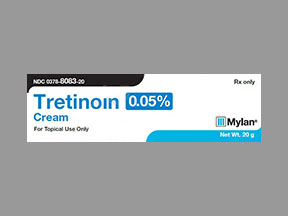
Retin-a Coupons & Savings Card – Discount Prices from $25.49
Brand for: Tretinoin
My prescription
Edit
20GM of 0.05%, Tretinoin (1 Tube)
Select pharmacy

CVS
$40.06
COUPON PRICE
Albertsons
$25.49
COUPON PRICE
Walgreens
$34.60
COUPON PRICE
Walmart
$37.43
COUPON PRICERetin-a savings card
Show this card to your pharmacist
Albertsons
$25.49
BIN
ID
PCN
GRP
011867
LH31FD3AAE
HT
LABH001
Powered by
Related retinoids prescriptions
More prescriptions for leukemia
Related retinoids prescriptions
More prescriptions for leukemia
Price history for Retin-a (brand) & Tretinoin (generic)
1 Tube, 20GM of 0.05%
Average retail price for Retin-a
Average retail price for Tretinoin
Average SaveHealth price for Tretinoin
Our price history data is based on aggregated prescription data collected from participating pharmacies in America. Our prescription data updates daily to reflect the latest price changes. If you notice a missing data point, it means there wasn't sufficient data available to generate a monetary value for that date.
Over the last 12 months, the average discount price of Retin-a is $60.38 using the SaveHealth savings card. That's an average savings of 26.21% on Retin-a with our discount card.
*Retail prices are based on pharmacy claims data, and may not be accurate when we don't have enough claims.
Retin-a (Tretinoin) dosage forms
Dosage Quantity Price from Per unit 15GM of 0.01% 1 Tube $34.62 $34.62 15GM of 0.01% 2 Tubes $50.93 $25.46 15GM of 0.01% 3 Tubes $75.25 $25.08 15GM of 0.01% 4 Tubes $91.57 $22.89 15GM of 0.01% 5 Tubes $107.89 $21.58 15GM of 0.025% 1 Tube $39.81 $39.81 15GM of 0.025% 2 Tubes $67.25 $33.63 15GM of 0.025% 3 Tubes $99.73 $33.24 15GM of 0.025% 5 Tubes $148.68 $29.74 15GM of 0.025% 10 Tubes $271.06 $27.11
| Dosage | Quantity | Price from | Per unit |
|---|---|---|---|
| 15GM of 0.01% | 1 Tube | $34.62 | $34.62 |
| 15GM of 0.01% | 2 Tubes | $50.93 | $25.46 |
| 15GM of 0.01% | 3 Tubes | $75.25 | $25.08 |
| 15GM of 0.01% | 4 Tubes | $91.57 | $22.89 |
| 15GM of 0.01% | 5 Tubes | $107.89 | $21.58 |
| 15GM of 0.025% | 1 Tube | $39.81 | $39.81 |
| 15GM of 0.025% | 2 Tubes | $67.25 | $33.63 |
| 15GM of 0.025% | 3 Tubes | $99.73 | $33.24 |
| 15GM of 0.025% | 5 Tubes | $148.68 | $29.74 |
| 15GM of 0.025% | 10 Tubes | $271.06 | $27.11 |
| 20GM of 0.05% | 1 Tube | $32.60 | $32.60 |
| 20GM of 0.1% | 1 Tube | $27.16 | $27.16 |
| 20GM of 0.1% | 2 Tubes | $36.01 | $18.00 |
| 20GM of 0.1% | 3 Tubes | $52.87 | $17.62 |
| 20GM of 0.1% | 4 Tubes | $61.72 | $15.43 |
| 20GM of 0.1% | 6 Tubes | $79.44 | $13.24 |
| 20GM of 0.05% | 2 Tubes | $55.61 | $27.80 |
| 20GM of 0.05% | 3 Tubes | $75.92 | $25.31 |
| 20GM of 0.05% | 4 Tubes | $96.22 | $24.05 |
| 20GM of 0.05% | 5 Tubes | $116.53 | $23.31 |
| 20GM of 0.025% | 1 Tube | $23.82 | $23.82 |
| 20GM of 0.025% | 2 Tubes | $36.01 | $18.00 |
| 20GM of 0.025% | 3 Tubes | $52.87 | $17.62 |
| 20GM of 0.025% | 4 Tubes | $61.72 | $15.43 |
| 20GM of 0.025% | 6 Tubes | $79.44 | $13.24 |
What does Retin-A do to your skin?
Retin-A, which contains the active ingredient tretinoin, is a topical medication used to treat acne and improve the appearance of the skin. It works by promoting cell turnover, which helps to unclog pores, reduce the formation of acne, and improve skin texture. Additionally, Retin-A can help reduce the appearance of fine lines, wrinkles, and hyperpigmentation by stimulating collagen production and promoting the shedding of old skin cells.
Is Retin-A the same as retinol?
Retin-A and retinol are not the same, although they are related. Retin-A is a brand name for tretinoin, a prescription-strength retinoid used primarily for acne and anti-aging. Retinol, on the other hand, is a milder, over-the-counter form of vitamin A used in skincare products for similar purposes but is less potent than tretinoin.
Why is Retin-A prescription only?
Retin-A is prescription only because it contains tretinoin, a potent form of vitamin A that can cause significant side effects if not used properly. A healthcare provider needs to evaluate a patient's skin condition, medical history, and potential for adverse reactions before prescribing it. This ensures safe and effective use, as tretinoin can cause skin irritation, increased sensitivity to sunlight, and other side effects.
Can you buy Retin-A over the counter?
Retin-A is not available over the counter. It requires a prescription from a healthcare provider.
What should you avoid doing when using Retin-A?
When using Retin-A, one should avoid excessive sun exposure and use sunscreen daily, as the skin can become more sensitive to sunlight. It's also advisable to avoid using other skin products that can cause irritation, such as harsh soaps, astringents, or products containing alcohol, spices, lime, or menthol. Additionally, one should avoid waxing or using hair removal creams on treated areas, as well as using other topical acne medications unless directed by a healthcare provider.
